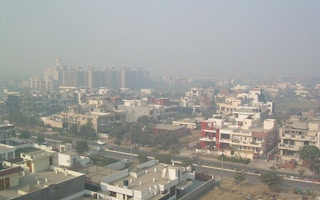For Londoners approaching the mellowness of old age, today may bring back some poignant memories: the lethal great smog of London blanketed the UK capital exactly 65 years ago, bringing death to thousands of people.
Now, nearly a lifetime later, air pollution is still sending large numbers of Londoners and other Britons to an early grave.
The great smog lasted from 5 to 9 December 1952. The UK Met Office records: “The smoke-like pollution was so toxic it was even reported to have choked cows to death in the fields.
It was so thick it brought road, air and rail transport to a virtual standstill.” On the Isle of Dogs, in London’s Docklands, people could not see their feet for the fog.
To remember the victims of air pollution and to stimulate ideas and action to improve modern air quality a British group, the New Weather Institute, is launching a scheme today in London.
It starts with an act of remembrance in one of central London’s most polluted spots, close to the River Thames, with the laying of a wreath of black flowers, symbolising the pollution that penetrates into people’s lungs.
But the initiative is not just about 1952, nor solely about the United Kingdom. It is a reminder that lethal air quality persists, 65 years on, in many parts of the world, causing an estimated 6.5 million premature deaths annually.
After the wreath-laying the organisers will establish a video link with Delhi, the city which has possibly the world’s worst air quality, with local people reporting on conditions there.
On 3 December a cricket match in the city between India and Sri Lanka was repeatedly halted as players said they were vomiting continuouslybecause of dangerous levels of pollution.
“
Lots of things in life we have choices about. Breathing isn’t one of them.
New Weather Institute
The event also sees the launch of a website, Clear the air – a tale of two cities, which tells the stories and hopes of people living parallel lives in London and Delhi for whom air pollution is inescapable.
It includes people who work on the street in both cities, those who drive taxis, are runners, work professionally to tackle air pollution, and those who live with its health consequences.
Over 4,000 people are thought to have died in London’s 1952 smog. By today 8,700 people in London will have died prematurely in 2017 because of major air pollutants, with more than one person an hour dying before their time.
Globally, premature deaths linked to air pollution are estimated to be more than 12 per minute, or about one every five seconds.
People are also being invited to share their experiences of air pollution on social media with the hashtag #SmogDay – because for some, the New Weather Institute says, pollution in cities is a problem that never goes away.
Ending the air pollution that causes early death and makes the lives of millions much more difficult will also tackle the emissions that lead to climate change, the Institute stresses.
Visibility problem
This is a time of year when swathes of the most populated parts of the planet suffer choking pollution. But despite the clouds of smog, it says, too often this is an invisible problem.
And even when it is in clear sight, finding reasons not to act is often easy.
Another Asian capital with an unenviable record for its pollution levels is Beijing, although it does not reach Delhi’s saturation. For Beijing, separating cause and effect in the relationship between climate change and air quality is not straightforward.
At the UN HQ in New York 193 countries are involved in negotiating a series of resolutions on pollution, and cities everywhere are being encouraged to be part of UN Environment’s BreatheLife campaign to improve urban air quality.
The great smog of 1952 led to UK legislation on clean air. But campaigners insist that that now needs updating, with a right to clean air enshrined in law.
“Lots of things in life we have choices about. Breathing isn’t one of them,” says the New Weather Institute. “We hope Smog Day becomes an annual day which helps keep the issue visible for the whole year.”
This story was published with permission from Climate News Network.








